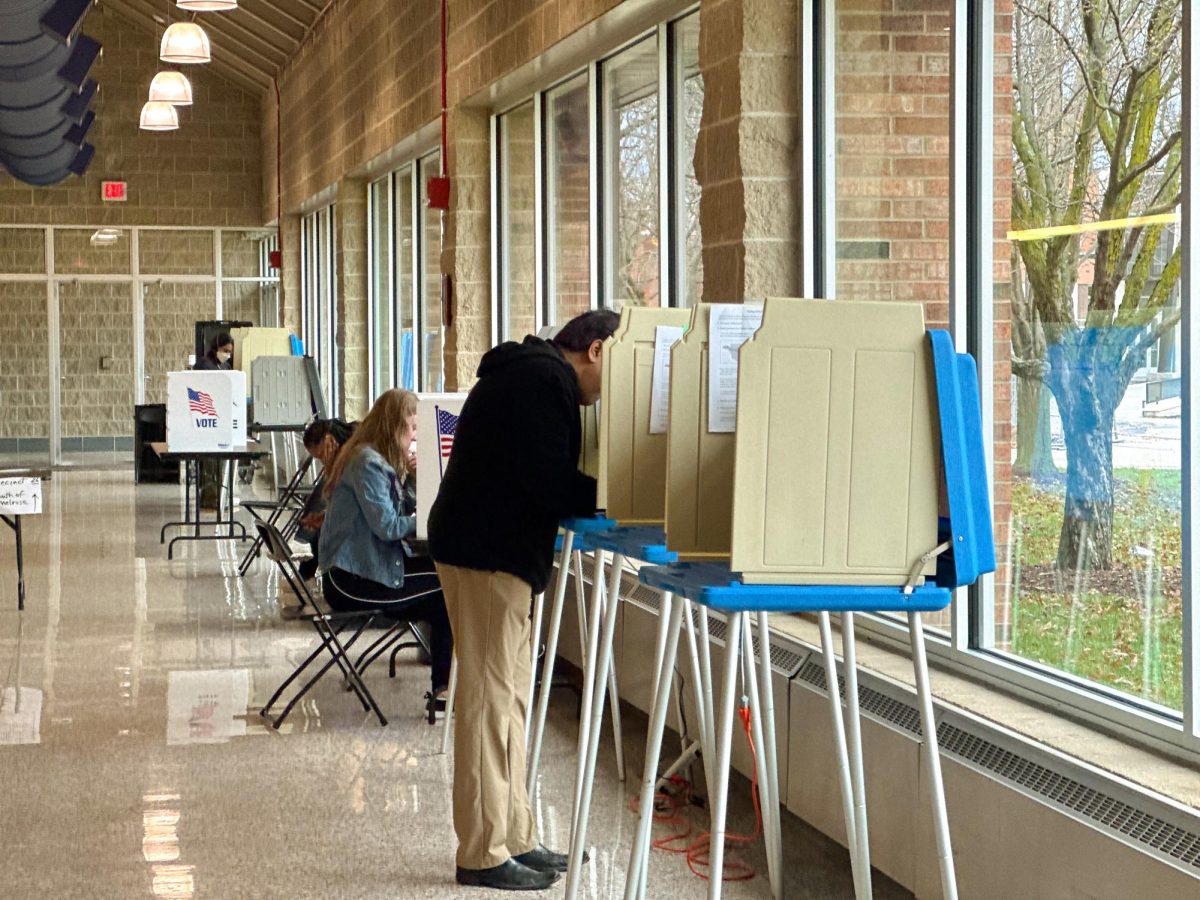Iowa legislators returned to Des Moines for the start of the legislative session on Jan. 13. For a majority of the representatives covering areas in the Iowa City Community School District, this is not their first time at the Capitol as a legislator. This is an exception to Judd Lawler, the newly elected District 91 representative in the House.
The session is the designated time the legislature meets, usually from January to April, to make laws. There are exceptions to this timeframe; sometimes sessions get extended, or special sessions are called outside of the usual time, for example, the special session Governor Kim Reynolds called in 2023 to pass stricter abortion restrictions.
The bills passed in the session go through two “funnel” deadlines. One is on March 7; by this point, bills will have had to make it through a full committee in the chamber of introduction, and the second is on April 4, where bills must pass the full committee in the opposite chamber. Spending bills and policy changes are exempt from these deadlines.
Last year
Education was the subject of multiple bills passed during last year’s session. HF 2612 changed the way funding for the state’s Area Education Agencies was distributed, moving some of the funding to districts themselves.
HF 2526 required school districts with over 8,000 students to employ a school resource officer unless the district votes not to. The Iowa City Community School District was one of those that opted out.
Iowa’s six-week abortion ban also went into effect last year after being temporarily blocked by a federal judge. The measure was originally passed in July 2023, but was not implemented until July 2024.
Another bill blocked by a federal judge was SF 2340, a bill that would allow state and local police to arrest undocumented immigrants and deport them. The bill would create a crime of “illegal reentry” at the state level, and undocumented immigrants could face up to two years in prison for attempted or successful entry into the United States after being denied admission or deported from the nation. A federal judge upheld the block on Jan. 24, so the law will not be going into effect.
The Conditions of the State Address
This year, Iowa Gov. Kim Reynolds outlined her priorities for the session in her Conditions of the State Address on Jan. 14. In her speech, which was around 45 minutes long, Reynolds discussed education, funding for cancer research, unemployment benefits and childcare, among other things.
Reynolds dedicated the first part of her speech to the accomplishments the state has made. She listed the first places in multiple categories in national rankings, the elimination of tax on retirement income and the consolidation of agencies. Her first policy proposal was announcing Iowa’s own Department of Government Efficiency, modeled after the one that Donald Trump started for his second term.
On the issue of healthcare and job creation, Reynolds plans to create hundreds of new residency slots at 14 teaching hospitals using 150 million dollars in requested funding. Reynolds will also be requesting three million in grants to train and educate nurses and CNAs.
Reynolds also mentioned that Iowa has the second-highest cancer rates in the nation. “Every case of cancer is a tragedy. And I’m concerned by the data showing that these tragedies disproportionately affect Iowans. Our state has ranked second for new cancer cases two years running, and we’re one of just two states with rising rates,” she said.
She continued to announce a partnership between Iowa Health and Human Services and the University of Iowa to create a team of epidemiologists to investigate; she requested one million dollars for their work.
She also discussed her interest in implementing a statewide phone ban in schools that would require a minimum standard that all districts adopt.
“Eighty percent of Gen Z spends over six hours per day on their phone. It’s unhealthy, and the results are as predictable as they are unacceptable: lost sleep, lower productivity, more distractions and increased anxiety,” Reynolds said. “That’s why I’m proposing legislation that requires schools keep instructional time free from digital distractions—at a minimum.”
Reynolds also asked for 16 million in funding for a grant program that would integrate operations between preschool centers and childcare providers. The program would also provide three-year grants of $100,000 annually to preschool centers and childcare providers for the purpose of this integration. She is also starting a statewide fund that would allow people to donate money to be distributed to increase the wages of childcare workers.
Legislative priorities
In Iowa, Republicans have a supermajority in both chambers, meaning it will likely be easier for them to get more partisan legislation passed. Their priorities are mostly summarized by what Reynolds said in her speech.
House Democrats outlined their priorities in a press conference in September. They consisted of: restoring reproductive freedom, supporting public education, lowering costs for Iowans and legalizing recreational marijuana.
There are areas where Democrats and Republicans can find some common ground, such as cell phone bans in schools, childcare and cancer research. Two legislators, one a Republican and the other a Democrat, explain their personal priorities for the session.
Cindy Golding—House District 83
Rep. Cindy Golding, who represents House District 83, said her personal priorities for the year include property tax reform, childcare, healthcare, mental health and property rights. Golding, a Republican, is a current member of the local government committee and justice systems appropriations subcommittee.
A big priority of Golding’s is to overturn a decision she sees as an infringement of eminent domain. Golding is one of almost 40 legislators who have filed a lawsuit against the Iowa Utilities Commission to overturn their approval of a carbon-capture pipeline.
“We are specifically protected in the Constitution from the government taking private property for private use, and that seems to be happening for the carbon,” Golding said. “The liquefied carbon sequestration, whether they want to take carbon dioxide, condense it into a liquid and pump it down into the ground, but they want to put the pipelines across private property, and the only benefit is to the company.”
A big thing that Iowa Republicans hope to implement this year is property tax cuts. Reynolds said in her speech that the state government is collecting too much in taxes from Iowans and hopes to decrease that.
Like Reynolds, Golding hopes to lower the cost of childcare for parents. As a mother and a grandmother, she said she noticed that the price of childcare was too high and was a real issue for families. Both Democrats and Republicans have expressed interest in lowering childcare costs.
“We want to go at it in a multi-faceted way that makes childcare more affordable in a realistic way. Because you hear people say, ‘We need to pay childcare providers more money.’ Who’s going to pay more money—the people who hire them?”
In her speech, Reynolds spoke about the lack of healthcare providers in the state and introduced a program that would incentivize physicians to go to rural areas. Golding takes this further, saying a similar thing about mental health providers.
“We do not have enough mental health providers to serve our citizens, so we have to find some ways to incentivize that, to encourage mental health providers to go into our rural areas,” Golding said. “And, one of the things I’ve observed [is]…we come up with great ideas that sound good on paper, but we need to talk to the people in the industry to find out what they really need.”
Janice Weiner—Senate Minority Leader
West High alum, District 45 senator and Senate Minority Leader Janice Weiner shared some similar priorities outlined by Reynolds and Golding, despite being from a different political party, such as a cell phone ban in schools and investing in cancer research.
She said her party as a whole is going to be focusing most on economic issues. “We are focusing on issues that really can make a difference in people’s lives and their pocketbooks, such as childcare, such as housing because we have a huge shortage of affordable housing all over the state, not just in this area and as well as reproductive rights,” Weiner said.
While Weiner said she didn’t quite know what the session would look like this year, she said she knew what it wouldn’t be. “What it’s not going to be is a repeat of the last two sessions where a big education-related, controversial education-related bill was drafted at the beginning of the session then became the hallmark of the session,” Weiner said.
Instead of focusing on K-12 education, legislators are moving their focus to younger ages—childcare and preschool. While Reynolds spoke about childcare in her Conditions of the State Address, she did not speak about preschool, which surprised Weiner.
“She talked about child care soon, but she didn’t talk about expanding preschool, which is really what gives kids a leg up and really helps them develop social skills and emotional skills and academic skills,” Weiner said.
Another bipartisan supported issue on the docket this year is distracted driving. Under current law, electronic devices cannot be used to write, send or view messages while driving. SF 22, which was recommended for passage by the subcommittee, expands on this and would restrict the use of electronic devices while driving, prohibiting their use unless the vehicle is not in motion and off the traveled part of the road or as far away as is reasonable. Electronic devices would still be able to be in use using a voice activator or hands-free mode.
Potential consequences of a violation are getting a license suspended for two or more violations of the law. The department would be barred from issuing a new license until a year has passed or the person reaches the age of 18, whichever is longer. A person could also be subject to a $100 fine if no one is injured; in the case of an injury, the fine increases.
Not all issues this year are bipartisan. Weiner said she expects the political climate in the capitol to be different this year after the election and inauguration of President Donald Trump.
“I’ll be paying very close attention to see if there are things being said in Washington by the Trump administration that Republican colleagues and legislature decide they’re going to try and mimic,” Weiner said.
Some states, such as California, have made attempts to “Trump proof” their states on issues such as climate change, abortion, disaster aid and LGBTQ+ rights. While Iowa Democrats don’t have the numbers to write legislation like in California, Weiner says the party is still dedicated to protecting minorities.
“We don’t, frankly, have the numbers to change the laws right now, but we will stand up, and we will stand by them,” she said. “Sometimes being present and looking people in the eyes who want to harm other people is sometimes an option in the ways to stand up.”
Follow along
There are many ways to get involved with the state government without being a legislator. Committee hearings are often open to the public, and subcommittee meetings are available via Zoom or in person, where constituents can submit public comments.
Legislators want to hear from their constituents about the issues they care about. As Weiner said, “Politics cares about people, even when people don’t care about politics.”
Legislators can be contacted via email or phone. Contacting a legislator is a good way to get more information on a bill and share one’s opinion on the legislation being discussed.
“I just want to see what people care about, what they’re asking. If there’s we’re also there for constituents. So constituents have problems that need to be solved, but something that we can help with by talking to a state agency. We’ll do it. Just try and be clear about what what the issue is and what you’re concerned about,” Weiner said.

All bills that are being considered can be viewed on the legislature’s website, legis.iowa.gov.
For something less overwhelming, consider subscribing to your legislators’ newsletters to see what they are doing at the capitol. News outlets such as the Des Moines Register will also send out regular updates on what is going on in the capitol.
Most importantly, know that legislators in the capitol are there to serve the needs of their constituents.
“It’s your world, your legislature. We are your employees in Des Moines, and everyone should view us as such,” Weiner said.
Subscribe to our newsletter!
"*" indicates required fields


































